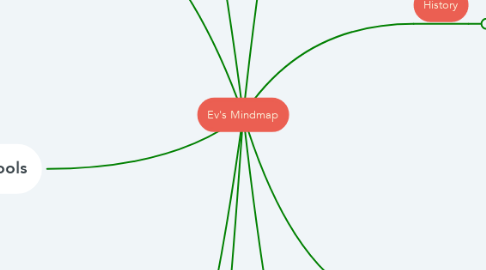
1. Sociology
1.1. theoretical perspectives
1.1.1. functionalism
1.1.1.1. general perspective of the interdependence of the social system
1.1.2. conflict theory
1.1.2.1. idea that stronger groups will impose their will on weaker groups
1.1.3. interactionalism
1.1.3.1. criticisms and varying perspectives of functionalism and conflict theory
1.2. five effects
1.2.1. knowledge and attitudes
1.2.1.1. differences in schools makes an impacts on student's education
1.2.2. employment
1.2.2.1. better education can mean better employment opportunities
1.2.3. education and mobility
1.2.3.1. how much school and what school you go to can effect social status
1.2.4. teacher behavior
1.2.4.1. the behavior of the teacher has a huge impact on how and how much students learn
1.2.5. student peer groups and alienation - how students view themselves as individuals and in association with others effects their growth
2. Philosophy
2.1. world view
2.1.1. pragmatism
2.1.1.1. a sort of general, "by the book," approach to the enforcement of educational policies
3. Schools
3.1. elements of change
3.1.1. school processes
3.1.1.1. Conflict has a negative impact on the effect of change. Behaviors of the people involved can either have a positive or negative impact. Getting change to be accepted in the unity of team building is important
3.1.2. school cultures
3.2. stakeholders
3.2.1. senators
3.2.1.1. Luther Strange, Richard Shelby
3.2.2. house of representatives
3.2.2.1. Bradley Byrne, Martha Roby, Mike Rogers, Robert Aderholt, Mo Brooks, Gary Palmer, Terri Sewell
3.2.3. state superintendent
3.2.3.1. Ed Richardson
3.2.4. local superintendent
3.2.4.1. Matt Akin
3.2.5. representative of state school board
3.2.5.1. Mary Scott
3.2.6. members of local school board
3.2.6.1. Elisa Ferrell, Walker McGinnis, Beth Wilder, Michelle Watkins, Pam Hill
4. Educational Reform
4.1. school based reforms
4.1.1. school to work - prepare high school graduates to work non-degree jobs, gives them skills and certifications needed for their job
4.1.2. privatization - private firms buy out public schools making them private. School benefits by staying open and private firm profits
4.2. reforms
4.2.1. community - makes education more equal, educates students along with the community, focuses on the student's needs in and outside of school
4.2.2. societal - attempts to change the culture in and outside of the school, attempts to work with what is at hand and improve upon it at the social level
5. Equality of Opportunity
5.1. gender - girls more likely to graduate but gender gap is lessening and achievement level is becoming more equalized
5.2. race - Hispanic students lowest level of graduation rate, next lowest is African- American
5.3. class- socioeconomic status is important. Poor schools have lower level of achievement. Poor school zones have lower level of achievement. Poor students have lower level of achievement
5.4. two responses
5.4.1. 1 he didn't properly approach control group variables such as parental effects
5.4.2. 2 study suggests how class affects level of educational achievements
6. Politics
6.1. Purposes
6.1.1. intellectual
6.1.1.1. educate students with knowledge, analytical, and evaluative skills
6.1.2. political
6.1.2.1. prepare future politicians and political entities
6.1.3. social
6.1.3.1. prepare students to be citizens and adults one day
6.1.4. economic
6.1.4.1. prepare students for the reality of the financial world
6.2. Perspectives
6.2.1. role of the school
6.2.1.1. liberal perspective
6.2.1.1.1. government involvement when needed; main focus on equality
6.2.2. explanations of unequal performance
6.2.2.1. when left unregulated, abuse of powers can occur
6.2.3. educational problems
6.2.3.1. Poverty on both the side of the school system and the students has major negative consequences for the education system. A lack of educational reform can be a factor in holding schools back. A lack of family support for students can hold them back as individuals
7. History
7.1. Movement
7.1.1. schools have moved from a very rudimental level to being of the highest esteem in societal regard
7.2. historical interpretation
7.2.1. the demographic imperative and the technological perspective fail because they are based on false premises. The "popular demand" evidence appears convincing but is not altogether persuasive
8. Curriculum & Pedagogy
8.1. Developmentalist is based on students and their desires for course of study.
8.2. two dominant traditions
8.2.1. mimetic states that education is about learning fixed knowledge
8.2.2. didactic states that learning comes from lecture and proper transmission of knowledge through this type of communication. Teacher and student both benefit
9. Educational Inequality
9.1. cultural differences
9.1.1. cultural capital - more affluent families provide better resources and opportunities for their children; enhancing the child's capacity for education
9.1.2. Ogbu's later works- suggest African- American students resist their culture and accept culture of the school to achieve better education
9.2. school centered
9.2.1. school financing - contrasts schools in affluent suburbs with public schools in poor inner cities, describes differences in funding between schools
9.2.2. effective school research - states teachers cannot be blamed if school funding is problem or teachers can only have limited effect in schools
9.2.3. curriculum & pedagogic practices - describes how differences in school climates affects academic performance
9.2.4. curriculum & ability grouping - differences in groups of students in same school shows that school characteristics may be affecting academic performance

